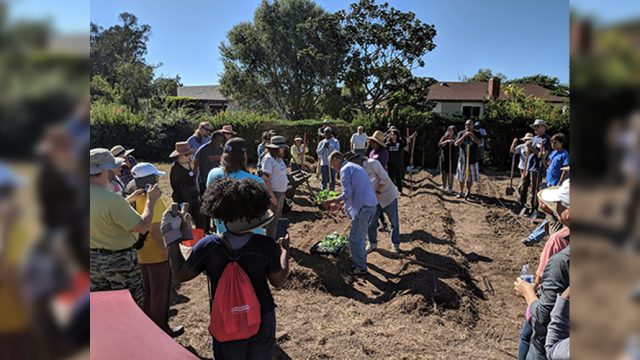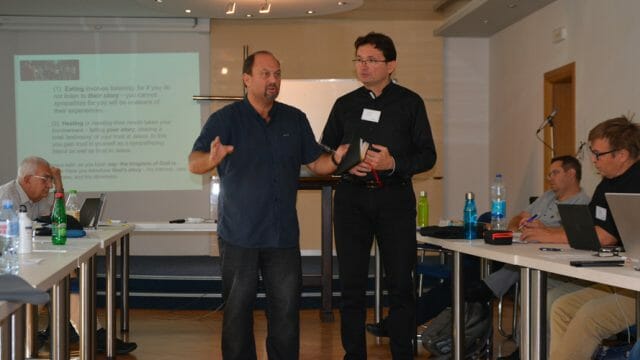The solid Word of God

One of the biggest battles we will ever face is over the authority of the Word of God. The devil has always hated God’s Word and does everything he can to neutralize its effect. Our sacred responsibility as Seventh-day Adventists is to protect, lift up, and promote the lifesaving power of God’s sure Word—the Bible.
The world around us is falling apart. People are distraught about security and personal safety. Life has become uncertain. What is needed is not a political, military, or social solution, but a return to a solid foundation—God’s sure Word.
Peter shared tremendous certainty in God as he faced his approaching death: “For we did not follow cunningly devised fables when we made known to you the power and coming of our Lord Jesus Christ, but were eyewitness for His majesty. . . . And so we have the pro- phetic word confirmed [“a more sure word of prophecy” (KJV)], which you do well to heed as a light that shines in a dark place, until the day dawns and the morning star rises in your hearts” (2 Peter 1:16-19).
The Word of God has always been a light shining in a dark place. The Bible is authoritative. It is our handbook for living, not just something to put on a table or analyze for academic purposes.
Peter went on to write: “Knowing this first, that no prophecy of Scripture is of any private interpretation, for prophecy never came by the will of man, but holy men of God spoke as they were moved by the Holy Spirit” (verses 20, 21).
People have always needed a sure foundation. The sure word of prophecy is something we can count on. It points to Christ, His righteousness, His salvation, His ministry in the most holy place, and His final redemption of His people at His second coming. It is our enormous privilege to share it through the power of the Holy Spirit.
But sadly, the Word of God is frequently ignored. Some misinterpret and misapply that which is plainly taught in Scripture. The Bible is reinterpreted by those who participate in higher criticism or the historical-critical approach to Scripture; those who place themselves above Scripture as they interpret it according to their own standards and approaches.
AS IT READS
We Seventh-day Adventists faithfully follow and promote the historical-biblical method of interpreting Scripture, allowing the Bible to interpret itself. The Methods of Bible Study document, voted by representatives of the world church,¹ outlines how to study God’s Holy Word, following the historicist view of prophecy and biblical understanding. Ellen White wrote: “If we would not build our hopes of heaven upon a false foundation we must accept the Bible as it reads and believe that the Lord means what He says.”²
As we face the last days of earth’s history, there will be determined efforts by Satan to destroy the effectiveness of the Bible and the Spirit of Prophecy. We see the neutralization of God’s authoritative Word all around us. It is Satan’s plan to undermine God’s plain “Thus saith the Lord,” knowing that if he can get God’s people to look to themselves and their own opinions he can bring in dissension, disunity, and tension. It is one of his greatest tools against the mission of the Seventh-day Adventist Church.
The Word of God is the product of heavenly inspiration and provides an accurate account of the great controversy between good and evil—between Christ and Satan. This is why the devil is determined to destroy the truth found in the Bible, but he will not succeed.
God is faithful. Through His power let’s respond in faithfulness to Him. There are absolutes, and they are found in the Word of God.
THE BEREANS
We read about the Bereans in Acts 17. “And the brethren immediately sent away Paul and Silas by night unto Berea: who coming thither went into the synagogue of the Jews. These were more noble than those in Thessalonica, in that they received the word with all readiness of mind, and searched the scriptures daily, whether those things were so” (verses 10, 11, KJV).
Many of the Jews in Thessalonica were jealous of Paul and Silas’ popularity and were unwilling to dig deeply into the Word, allowing the gospel to transform their lives. Instead, they succeeded in putting the city into an uproar. To avoid further violence, the believers sent Paul and Silas to Berea. There they found open-minded Jews who were willing to listen and dig into the Scriptures to prove whether or not what they heard was right. The truth became real to them.
Ellen White observed: “Daily they searched the inspired records, and as they compared scripture with scripture, heavenly angels were beside them, enlightening their minds and impressing their hearts.”³ Today heavenly angels are by our sides, opening our minds as we prayerfully study the Scriptures, and the Holy Spirit brings conviction and conversion.
DANGERS AND DISTRACTIONS
We are living in the Laodicean last-day period when Christianity is often superficial. The devil will try everything to distract us from the Bible and the truth, using every possible means to take us away from God’s Word.
Another great danger we face is living in an age of “experiential religion.” People claim you have to “feel” the spirit, asserting religion must be “experienced” to be real. Emphasis is placed more on feeling, similar to the Thessalonians, rather than on searching the Scriptures, as the Bereans did.
Ellen White warned: “In the last days, the earth will be almost destitute of true faith. Upon the merest pretense, the Word of God will be considered unreliable, while human reasoning will be received, though it be in opposition to plain Scripture facts.”⁴ Feelings lie, but truth is based on the authority of Scripture. God’s Word never lies.
HIDDEN TREASURE
There are physical and mental benefits from studying the Bible and focusing on eternal values, as opposed to spending time on trivial things. We are promised, “The Bible is the book of books. It will give you life and health. It is a soother of the nerves, and imparts solidity of mind and firm principle.”⁵
The Word of God is like hidden treasure, as illustrated by Christ’s parable: “The kingdom of heaven is like treasure hidden in a field, which a man found and hid; and for joy over it he goes and sells all that he has and buys that field” (Matt. 13:44).
Reflecting on this, Ellen White observed: “In the parable the field containing the treasure represents the Holy Scriptures. And the gospel is the treasure. The earth itself is not so interlaced with golden veins and filled with precious things as is the Word of God.”⁶
The Bible reveals that salvation is possible only through complete reliance on Christ. It tells us the Sabbath is Christ’s special seal and covenant with His commandment-keeping people. It confirms our belief and hope in a soon, literal second coming of Christ.
While the church will be deluged with apostasies and false doctrine, the Word of God stands sure. “All should see the necessity of understanding the truth for themselves. . . . Apostasies have occurred and the Lord has permitted matters of this nature to develop in the past in order to show how easily His people will be misled when they depend upon the words of men instead of searching the Scriptures for themselves, as did the noble Bereans, to see if these things are so.”⁷
Only in following the lead of the Bereans will we be able to stand the final test, since the Bible is the only foundation on which to build. Satan will seek to destroy confidence in the landmark biblical truths we hold dear, but he will not succeed.
Jesus is coming soon! Be a Berean, searching the Scriptures daily to know the Word. Cherish it, believe it, love it, share it. Let us overcome the Laodicean crisis by hiding God’s Word in our hearts, being people of the Book, and sharing it with others.
¹The Methods of Bible Study document was voted at the Church’s Annual Council on October 12, 1986, held in Rio de Janeiro, Brazil. Available at www.adventist.org/en/information/official-state- ments/documents/article/go/-/methods-of-bible-study/
²Ellen G. White, Testimonies for the Church (Mountain View, Calif.: Pacific Press Pub. Assn., 1948), vol. 5, p. 171.
³Ellen G. White, The Acts of the Apostles (Mountain View, Calif.: Pacific Press Pub. Assn., 1911), p. 231.
⁴Ellen G. White, The Spirit of Prophecy (Battle Creek: Seventh-day Adventist Pub. Assn., 1870), vol. 1, p. 89.
⁵Ellen G. White, Counsels on Sabbath School Work (Washington, D.C.: Review and Herald Pub. Assn., 1938), p. 22.
⁶Ellen G. White, Christ’s Object Lessons (Washington, D.C.: Review and Herald Pub. Assn., 1900, 1941), p. 104.
⁷Ellen G. White, Selected Messages (Washington, D.C.: Review and Herald Pub. Assn., 1958), book 2, pp. 392-394.








